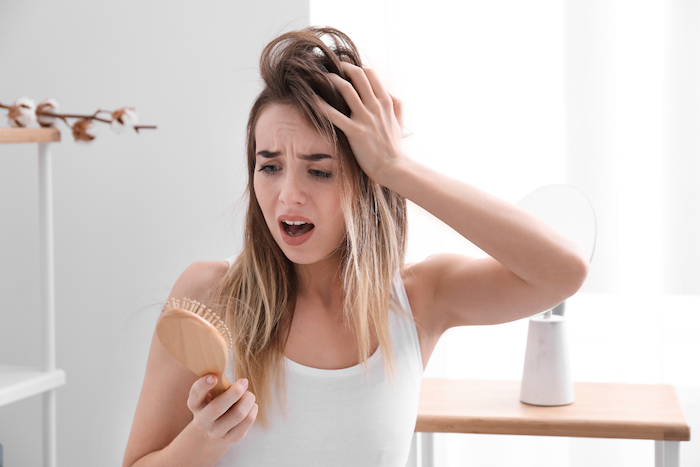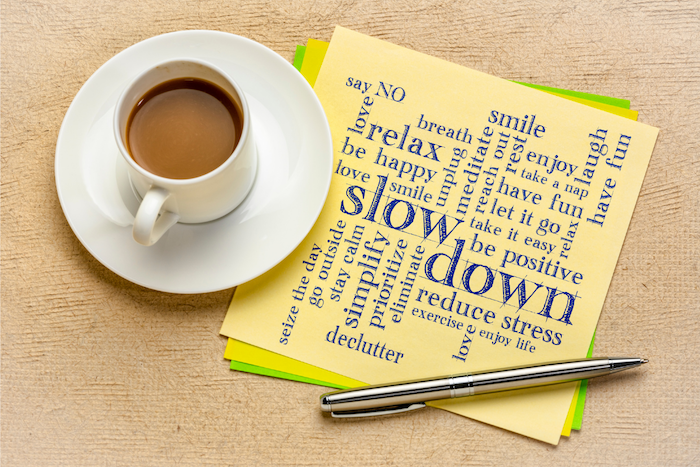If you’re experiencing any degree of hair loss, it could be caused by a range of issues. This can make it even more frustrating when you’re struggling to pinpoint the cause but not finding any answers. To help, I want to do a series of articles that outline the many reasons you may be experiencing hair loss – or just having trouble with your hair’s growth.
In today’s article, we’re going to look specifically at stress.
Perhaps one of the most common reasons for your hair to start falling out, the burden of daily stress is something we can unfortunately all relate to, regardless of where your stress is coming from. Whether it’s work related, due to a family situation, or even something highly emotional such as losing a loved one, this stress can affect your hair.
There are three different ways stress can contribute to hair loss. Let’s take a look at what they are, and then discuss what you can do if you think stress may be the cause of your hair loss.
The adult scalp contains approximately 100,000 hair follicles. At all times, your hair is cycling through four phases of growth.
Let’s take a look at these four stages:
Anagen: the growing phase – this is the longest phase, averaging about 3-5 years, but lasting as long as 7 years in some cases. During this phase, hair follicles are pushing out hairs that will continue to grow until they are cut or they end their lifespan and fall out. At any time, most of the hairs on your head are in this stage.
Catagen: the transition phase – this stage picks up right where the anagen phase left off, lasting about 10 or so days. At this time, hair follicles shrink, growth slows, and the hair separates from the follicle.
Telogen: the resting phase – this typically lasts around 3 months. After the hair separates from the follicle in the catagen phase, new hairs begin to form in the follicle. The recently-separated hair remains in place, neither growing nor falling out.
Exogen: the shedding phase – this phase is why you lose, on average, 50-100 hairs per day. These hairs are in the exogen phase and have come to their time to fall out. During this phase, which lasts about 2-5 months, new hairs are growing in the follicles to replace the fallen hair.
As it turns out, stress can affect the phases of hair growth. This type of hair loss is called telogen effluvium. It occurs when the cycle gets stuck in the telogen phase, allowing the hair to easily shed and fall out.
If this is the cause of your hair loss, you’ll notice that your hair easily falls out when you run your fingers through it, brush it, or shower. What’s worse, then, is that this lost hair doesn’t get replaced.

Sometimes referred to as “hair-pulling disorder”, trichotillomania is a condition – often induced by long-term stress – that involves irresistible urges to pull out hair from your scalp, eyebrows, or other areas of your body.
Trichotillomania can vary in severity, with some finding it minor and manageable, while others end up with bald patches on their head that they may go through a great effort to hide.
Signs or symptoms of trichotillomania include resisting the urge to pull, but to no avail, then feeling a sense of pleasure or relief once the hair is pulled. This leads to noticeable hair loss, typically in clusters on the head or even the eyebrows and eyelash. Additional signs or symptoms include the desire to bite, chew, or play with pulled hair.
Ultimately, someone with this condition will typically find that it’s impacting their way of life, causing distress or problems at work, school, or within social situations.
Many people who have trichotillomania also tend to bite their nails, chew their lips, or even pick at their skin.
For some, this may be a deliberate undertaking that provides some sense of pleasure. For others, this is more of a subconscious act that may occur while watching TV or reading without really realizing it.
For both, stress and anxiety is a main cause of the condition. If you’re stressed and think you may be pulling hair – absentmindedly or otherwise – this can not just cause temporary thin spots on your head, but may permanently damage the scalp and hair follicles, stunting further hair growth.
Alopecia areata is a condition where the immune system attacks the hair follicles, causing hair loss anywhere on the body.
Though its cause isn’t fully known, stress is believed to be a contributing factor. A lack of vitamin D is also thought to play a role.
There is no known cure, however the disease can be unpredictable, with many people often finding that their hair grows back on its own within a few years. After that, sometimes it returns, other times the condition is gone forever.
If your hair is falling out as a result of stress, essentially all you can do is find ways to manage your stress.
And even if you’re not losing hair, reducing your stress can greatly benefit your health in the short and long term.

Stress is a natural part of life, but when it becomes excessive or unmanageable, it can be harmful to both your mental and physical health – including your hair.
Below are ten ways that can help you reduce stress levels:
Exercise – When you’re stressed, your body is in fight-or-flight mode. This can lead to muscle tension, headaches, and other physical symptoms. Regular exercise can help your body manage stress more effectively and can also help to improve your mood.
Breathing exercises – Taking a few deep breaths can help calm your body and mind. There are a number of different breathing exercises that you can try, such as the 4-7-8 method (breathe in for 4 seconds, hold for 7 seconds, exhale for 8 seconds, repeat) or the box breathing technique (same thing as the 4-7-8, but 4-4-4).
Yoga or meditation – Both yoga and meditation can be effective ways to reduce stress. Yoga helps to improve flexibility, strength, and balance, while meditation can help to focus the mind and bring on relaxation.
Get enough sleep – When you’re exhausted, it can be tougher to manage stress effectively. Getting enough sleep is essential for overall health and can help to improve your mood and energy levels.
Eat healthy – Eating nutritious foods helps to support your body both physically and emotionally. When you’re stressed, it’s important to avoid foods that are high in sugar and caffeine, as they can further aggravate your symptoms.
Connect with loved ones – Spending time with friends and family can help to reduce stress levels. Whether you stay in touch via text, social media, or in person, simply having someone to talk to can be very helpful.
Take a break – When you’re feeling overwhelmed or stressed, it can be helpful to take a short break. This could involve stepping away from your work for a few minutes to get some fresh air, taking a hot bath, or practicing relaxation techniques.
Organize your time – When you’re feeling stressed, it can be helpful to take a step back and look at how you’re spending your time. Are there tasks that you can delegate or eliminate altogether? Creating a schedule can help to reduce stress and make sure that you’re using your time effectively.
Set realistic goals – When you’re stressed, it can be tough to stay motivated. It’s important to set realistic goals for yourself and to break down large tasks into smaller, more manageable goals.
Seek professional help – If your stress is affecting your day-to-day life or causing significant distress, it may be best to seek professional help. A therapist can provide you with support and guidance as you work to manage your stress levels.
Now you know that stress can cause hair loss, along with why stress can cause hair loss.
This way, you have an actionable plan to get your hair back to its thick and luscious ways – seeking out methods to relax and lower stress levels.
I hope that this blog can help offer some guidance!
If you want to do even more to boost hair growth, read this.